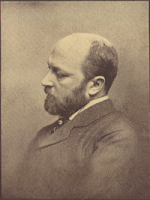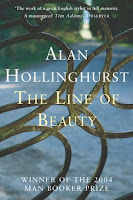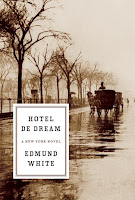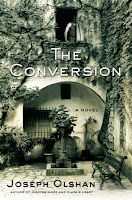 Having just finished The Conversion by Joseph Olshan, I find that a plethora, a torrent, a veritable cornucopia of recent gay lit seems to revolve around Henry James, "The Master".
Having just finished The Conversion by Joseph Olshan, I find that a plethora, a torrent, a veritable cornucopia of recent gay lit seems to revolve around Henry James, "The Master". Well, three books anyhow, but three books mark a trend. The first I noticed was the most Jamesian (and by far the best), Alan Hollinghurst's 2004 novel The Line of Beauty. Chronicling upper-class life in Thatcher's Britain, Hollinghurst earned the Booker Prize. His first book The Swimming Pool Library was powerfully charged with social commentary, but The Line of Beauty was stunning, and all about the Henry James.
Well, three books anyhow, but three books mark a trend. The first I noticed was the most Jamesian (and by far the best), Alan Hollinghurst's 2004 novel The Line of Beauty. Chronicling upper-class life in Thatcher's Britain, Hollinghurst earned the Booker Prize. His first book The Swimming Pool Library was powerfully charged with social commentary, but The Line of Beauty was stunning, and all about the Henry James. Next up: Edmund White's 2007 novel Hotel de Dream in which Henry James appears as the villain. A riveting semi-fictional tale of Stephen Crane's last days from his wife's point of view, it echoes some of the death themes White first explored in The Married Man, echoing Paul Bowles' The Sheltering Sky. Although I prefer White's biographical novels, particularly The Beautiful Room is Empty, this is my favourite of his historical fictions thus far.
Next up: Edmund White's 2007 novel Hotel de Dream in which Henry James appears as the villain. A riveting semi-fictional tale of Stephen Crane's last days from his wife's point of view, it echoes some of the death themes White first explored in The Married Man, echoing Paul Bowles' The Sheltering Sky. Although I prefer White's biographical novels, particularly The Beautiful Room is Empty, this is my favourite of his historical fictions thus far. And finally, back to Joseph Olshan's The Conversion. It is also part of a recent spate of young-gay-Italian-American-Jew-under-a-loggia fiction that is clogging summer bookshelves from Provincetown to Fire Island (but I digress). The Conversion is chock full of Jamesian references, ranging from explicit mentions to flaming manuscripts to the aforementioned loggias. But it surprised me with its layered subtlety and insightful parallels, and it kept me guessing until the end.
And finally, back to Joseph Olshan's The Conversion. It is also part of a recent spate of young-gay-Italian-American-Jew-under-a-loggia fiction that is clogging summer bookshelves from Provincetown to Fire Island (but I digress). The Conversion is chock full of Jamesian references, ranging from explicit mentions to flaming manuscripts to the aforementioned loggias. But it surprised me with its layered subtlety and insightful parallels, and it kept me guessing until the end.Apparently part of the maturity of gay fiction is the rediscovery of the canonical figures from the mainstream whose gay subtexts were so very circumspect. At the same time, gay fiction has entered the mainstream and exists less and less as a separate genre (just try finding a section in a bookstore anymore). Eighty-eight years after his death, Henry James seems to be the model for gay fiction to come. Or maybe some excitable queens are taking the whole "Master" thing just a little bit too close to heart.
No comments:
Post a Comment